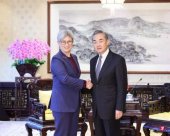The direct investment liabilities in China in the third quarter of this year decreased by $ 11.8 billion (the same, about 15.9 billion yuan). It was the first negative value since the record, showing the background of geopolitical tensions and rising global interest rates.In the following, China encounters challenges in attracting foreign capital.
China National Bureau of Foreign Exchange Administration last Friday (November 3) announced the preliminary number of China's international revenue and expenditure balance sheet in the third quarter and first three quarters of 2023 and the first three quarters of this year's capital and financial accounts.Investment assets increased by 54 billion US dollars, an increase of $ 15 billion in scale from the second quarter.Direct investment liabilities at the same time decreased by $ 11.8 billion, the lowest value in history, and it was also the first time since recorded records in 1998.
From the perspective of the first three quarters, direct investment assets increased by 142.9 billion US dollars, an increase of US $ 37.4 billion from a growth rate of US $ 105.5 billion in the same period in 2022.At the same time, the direct investment liabilities in the first three quarters increased by $ 15.5 billion, a significant contraction from $ 152.4 billion in the same period in 2022.
The debt of direct investment includes the inflow of direct investment in China, and the negative value of direct investment liabilities reflects some concerns when overseas companies enter China, including Western countries' "risks" to China and China's interest rates.Disadvantages.
According to Reuters, Goldman Sachs said in a report that because China's interest rate will maintain a lower level for a longer period of time, the interest rates of countries outside China will remain high for a longer period of time.Level, so capital outflow pressure may continue.
Capital Economics, Capital Economics, analyzed Julian Evans-PritChard that although he did not see that foreign companies are reducing evidence in China, "we do think thatAt least in the medium term, the increasingly intensified geopolitical tensions will hinder China the ability to attract foreign direct investment. "



